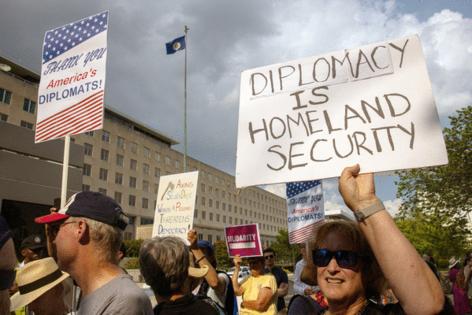Karishma Vaswani: Diplomatic experience is optional for the president's friends
Published in Op Eds
In diplomacy, it’s not always what you know — it’s who you serve. The White House has tapped a self-professed Hooters fan and an orthopedic surgeon for two key postings in Southeast Asia, a front line in the battle for influence between the U.S. and China. The inexperienced candidates for Singapore and Malaysia are raising eyebrows in a region Washington is already alienating with its trade war.
In the short term, a political appointee close to President Donald Trump could be positive. Longer term, Washington risks losing out on decades of carefully crafted diplomacy and relationship-building that have served to advance American interests.
The nominations came as Secretary of State Marco Rubio made his first official visit to Asia, where he attended the 10-member Association of Southeast Asian Nations gathering in Kuala Lumpur earlier this month. His trip also coincided with the renewal of tariff threats on regional economies, which Trump would impose on Aug. 1, Rubio confirmed, if countries don’t strike agreements by that deadline or shortly after. An ambassador who has the president’s ear could — in theory — help carve out a better deal.
But are bonhomie and being a golf buddy all that matter? Diplomacy is a blend of analytical thinking, meticulous attention to detail, and historical knowledge — along with many other attributes. Anyone watching the often-comical exchange between Singapore envoy-nominee Anjani Sinha and Democratic Senator Tammy Duckworth of Illinois at last week’s confirmation hearing would’ve struggled to find these qualities.
Sinha, who has been described as “a friend of President Trump for over a decade,” couldn’t answer Duckworth’s questions about trade surpluses, military exercises or tariff rates. Videos of the exchange have gone viral in Southeast Asia, with the senator chastising him for not doing his “homework,” and accusing him of treating Singapore like a “glamor posting.” Despite the pushback, Republicans hold the majority in the Senate and have enough votes to approve the nomination.
But probably the more contentious nomination is that of Nicholas Adams, Trump’s pick as ambassador to Malaysia. The 40-year-old, originally from Australia, became a U.S. citizen in 2021. In his native country, Adams courted some controversy: He was the youngest-ever deputy mayor when he served on a council in Sydney’s inner western suburbs, where he made headlines for calling for the eradication of pigeons and proposing DNA testing dog poo. The right-wing influencer has a strong conservative following, many of whom adore him for his alpha-male persona.
“Nick is an incredible Patriot and very successful entrepreneur, whose love of, and devotion to, our Great Country is an inspiration,” Trump wrote in a June 10 Truth Social post. “Nick graduated from the University of Sydney and, since then, has made it his life’s mission to extol the Virtues of American Greatness. Congratulations Nick!”
In his enthusiasm, the president may have overlooked Adams's history of Islamophobic remarks, which is already raising concern in Muslim-majority Malaysia. His nomination has to go through the Senate confirmation process before the appointment can be formalized, but many in Malaysia are calling for Adams to be rejected because he’s viewed “as an insult to the country's dignity and foreign policy.”
The decision is being seen as a broader erosion of American soft power in the region, Shahril Hamdan, a former visiting fellow with the Malaysia Program at the S. Rajaratnam School of International Studies, and host of a popular podcast, told me. “It reinforces the perception that Southeast Asia remains an afterthought in Washington’s strategic calculus — which only plays into the hands of its great rival, China.”
Political appointees aren’t unusual in U.S. diplomacy. It’s been common practice for decades for presidents to fill roughly 30% of chief-of-mission positions with them — far higher than any developed country. (The last ambassador to Singapore, appointed by the Biden administration, was Jonathan Kaplan, a wealthy businessman with no prior foreign policy experience.) That’s despite research showing that career officials are on average more effective leaders who oversee higher performance.
If confirmed, Adams will replace Edgard Kagan, a seasoned diplomat who has only served in the position for about 16 months. This decision comes at a difficult time for U.S.-Malaysian relations, with Prime Minister Anwar Ibrahim criticizing Trump’s long-threatened tariffs as “sharpened instruments of geopolitical rivalry.”
Southeast Asia has long been wary of being caught in the geopolitical power play between the U.S. and China. These nominations will cement the view that Beijing is a better partner — notwithstanding concerns over the muscle it’s been flexing in the Indo-Pacific and the South China Sea.
So far, the reactions from Asian capitals have been restrained. But privately, some diplomats have expressed no small degree of bewilderment. Ultimately, the choices reflect the priorities of the White House. In the Trump era, it’s not expertise in a region that lands you the job — it’s access to the man at the top.
_____
This column reflects the personal views of the author and does not necessarily reflect the opinion of the editorial board or Bloomberg LP and its owners.
Karishma Vaswani is a Bloomberg Opinion columnist covering Asia politics with a special focus on China. Previously, she was the BBC's lead Asia presenter and worked for the BBC across Asia and South Asia for two decades.
_____
©2025 Bloomberg L.P. Visit bloomberg.com/opinion. Distributed by Tribune Content Agency, LLC.

























































Comments